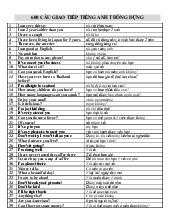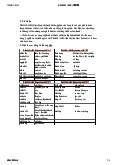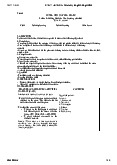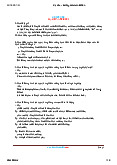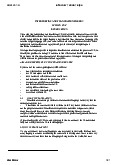



















Preview text:
17:22 29/7/24 Simon - Ielts Reading
TỔNG HỢP TIPS IELTS READING IELTS – SIMON Chào bạn.
Mình là Thanh Loan. Mình chia sẻ với các bạn tài liệu luyện Reading cực kì hữu ích cho các
bạn ở mọi trình dộ. Từ những chia sẻ của thầy Simon (ielts-simon.com), mình đã sắp xếp lại
theo thứ tự và logic như sau:
- Những tips và chú ý chung khi ôn IELTS Reading
- Cách dạng câu hỏi trong IELTS Reading (gồm cách làm, bài tập luyện tập, đáp án)
- Tổng hợp các từ vựng và keywords table đáng để học tập
Với tài liệu này, các bạn sẽ có được những cách ôn Reading tuyệt vời. Sauk hi làm xong tập
này với những tips, bài tập ngắn riêng lẻ, các bạn ôn với các đề trong c ố u n Cam (khuyên dùng
từ 7 – 10) rồi đi thi thôi.
Chúc các bạn học hiệu quả và nhớ ủng hộ mình
Sưu tầm từ trang ielts-simon từ đầu – 31/07/2015 SƯU TẦM: THANH LOAN 1 about:blank 1/101 17:22 29/7/24 Simon - Ielts Reading Contents
GENERAL TIPS ...................................................................................................................... 3 1.
Basic Information …………………………………………………………………...3 2.
IELTS reading and listening scores…………………………………………………….4 3.
Finding and understanding ……………………………………………………………4 4.
A good study technique .................................................................................................. 5 5.
Time ................................................................................................................................ 5 6.
Read 'real' things! ............................................................................................................ 6 7.
Official sample papers .................................................................................................... 6 8.
Some sites for daily reading ............................................................................................ 6 9.
Keyword technique ......................................................................................................... 7 10.
Underline key words ....................................................................................................... 7 11.
3 study tips to help you improve your reading ............................................................... 7 12.
6 tips to improve your reading ........................................................................................ 7 13.
Try this technique ........................................................................................................... 8 14.
Skimming and scanning? ................................................................................................ 9 15.
When to skim or scan ...................................................................................................... 9 16.
My advice ...................................................................................................................... 10 17.
Easy questions first ....................................................................................................... 10 18.
Reading to get ideas ...................................................................................................... 11 19.
Don't 'over-think' the answer ........................................................................................ 11
GAPS FILLING ..................................................................................................................... 12 TIPS 13 PRACTICES 13
CORRECT ANSWERS FROM SIMON 16
MATCHING NAMES ............................................................................................................ 18 SƯU TẦM: THANH LOAN 2 about:blank 2/101 17:22 29/7/24 Simon - Ielts Reading TIPS 18 PRACTICES 19
CORRECT ANSWERS FROM SIMON 20
MULTIPLE CHOICE QUESTION ...................................................................................... 21 TIPS 21 PRACTICES 21
WHICH PARAGRAPH CONTAINS THIS INFORMATION ............................................ 40 TIPS 40 PRACTICES 40
CORRECT ANSWERS FROM SIMON 42
TRUE/FALSE/NOT GIVEN ................................................................................................. 42 TIPS 43 PRACTICES 43
CORRECT ANSWERS FROM SIMON 55
MATCHING HEADING ....................................................................................................... 60 TIPS 60 PRACTICES 60
CORRECT ANSWERS FROM SIMON 69
KEYWORD TABLES AND VOCAB ..................................................................................... 72 GENERAL TIPS
1. Basic Information SƯU TẦM: THANH LOAN 3 about:blank 3/101 17:22 29/7/24 Simon - Ielts Reading
The Reading Test is immediately after the Listening Test at 10.40am. You do not get a break.
There are 3 sections in the Reading Test. Each section has 13 or 14 questions, making 40
questions in total. The test lasts 60 minutes, and in that time you must write your answers on an answer sheet.
Here are some of the problems students have with IELTS Reading:
Time is the biggest problem. Many students don't manage to finish the test.
The texts are long and contain some difficult vocabulary.
Students find "paragraph headings" questions difficult.
Students find "true/ false/ not given" questions difficult.
IELTS Reading is really a test of your vocabulary. If your knowledge of English words and
phrases is good, you will do well.
There are techniques that can help you to work faster and cope with the difficult question types.
However, the best way to improve your IELTS Reading score is by doing a lot of reading and vocabulary work.
2. IELTS reading and listening scores
Students often ask how many correct answers they need (out of 40) to get a band score of 7 in the
reading and listening tests.According to official IELTS guidelines:
Band 6 is about 23 out of 40 Band 7 is about 30 Band 8 is about 35 Note:
The score needed for each band can change depending on the difficulty of each test. If you
have a really difficult test, the score needed for band 7 might be 28 or 29. If the test is easier,
you might need to score 31 or 32 to get a 7. Click here to see the banding guide on the official IELTS website.
3. Finding and understanding
IELTS reading is really a test of 2 things:
1. Can you find the part of the text that contains the answer?
2. Do you understand that part of the text? SƯU TẦM: THANH LOAN 4 about:blank 4/101 17:22 29/7/24 Simon - Ielts Reading Finding
You need to be able to find the right part of the text quickly. I practise this a lot with my
students: we decide which words in the question we need to search for, then we try to locate
those words (or words with the same meaning) in the text. Understanding
When you have found where the answer is, you need to read that part of the text carefully.
Read the sentences before and after the keywords that you found. Then it becomes a test of
your vocabulary knowledge: if you don't understand the words that you are reading, it will be
difficult to get the right answer.
4. A good study technique
When practising with the Cambridge IELTS books, try this study technique: Choose a reading passage.
Go to the back of the book and get the correct answers.
Study the passage with the aim of proving why those answers are correct. Make a keyword table.
When you know what the answers are, you can focus on exam technique: searching for
keywords, then reading the relevant part of the passage carefully. You might find this helps
you more than simply testing yourself would. 5. Time
'Not having enough time' is the biggest problem for most people taking the reading test. Here
are some tips for dealing with this problem:
Go straight to the first question. Don't waste time reading the full passage or the first
sentence of each paragraph, and don't read any of the other questions.
Do 'paragraph' questions last. Questions that ask you to match headings or statements
with paragraphs are much easier if you are already familiar with the passage. SƯU TẦM: THANH LOAN 5 about:blank 5/101 17:22 29/7/24 Simon - Ielts Reading
Don't get stuck on one question. As soon as you realise that you are having difficulties
with a question, leave it and move to the next one. Return to difficult questions later if you have time.
Remember that the answers to most question sections are in order in the passage. You
don't need to go back to the beginning of the passage to search for each answer.
Only skim or scan for numbers and names. Otherwise, read at normal speed.
Work with an alarm. You can't do this in an exam, but at home you could set the alarm
(on your phone) for 2 minutes and try to do each question within this time. Note:
When preparing for the reading test at home, try not to worry about time at first. Your first
concern should be to get the score you need, even if it takes you 3 hours instead of 1 hour to do a full test.
6. Read 'real' things!
It's frustrating to see students who rely on textbooks to teach them everything about the English
language. Why read an article in an 'upper intermediate' textbook (that was probably written
10 years ago) when you could be reading 'real' articles in newspapers or on the Internet?
Read articles because you find them interesting, not because they have been written to
demonstrate a particular grammar point.
A suggestion: if you've read anything interesting recently, put a link to it (and maybe a quick
summary if you have time) in the comments area below this lesson.
7. Official sample papers
Have you tried doing the test samples on the official IELTS website (ielts.org)? Click here to
go to the academic reading download page, then here for the general reading samples.
8. Some sites for daily reading
People often ask about extra reading practice: Is it a good idea to read newspapers or
magazines, and which ones are the best for IELTS practice? SƯU TẦM: THANH LOAN 6 about:blank 6/101 17:22 29/7/24 Simon - Ielts Reading
Two good places to find articles are The Economist and National Geographic. Try to spend a
few minutes every day reading something from one of these sites. Make a note of some new
words or phrases, and gradually your reading will improve.
9. Keyword technique
https://www.youtube.com/watch?v=pSkjHMs9GjY 10. Underline key words
Hopefully you do this already, but it’s worth pointing out why underlining is so important
when you’re doing an IELTS reading test. I tell my students to underline the main words in the
question, then underline any similar words that they find as they read the passage.
There are 3 reasons why underlining is useful:
1. It encourages you to use the keyword technique to find the answers.
2. You don't lose your place in the passage when you're turning pages to check between the question and the text.
3. The same information may be relevant for a later question (e.g. when you do a
'paragraph headings' section last).
I can always tell when students have worked hard on a reading paper by the amount of
underlining or highlighting they have done. If you don't usually underline things, start now!
11. 3 study tips to help you improve your reading
Here are 3 study tips to help you improve your reading:
As I said in Saturday's lesson, the best way to get better at the reading test is by doing
more reading. Do as many practice tests as you can, and read other things e.g. books,
newspapers and online articles.
Try doing a reading test without a time limit, and with a dictionary. If you still can't get
the score you need, you'll need to look carefully at what you are doing wrong.
Spend time analysing your mistakes and the correct answers. If you don't understand why
an answer was right or wrong, ask a teacher to help you. You'll improve more quickly if you learn from your mistakes.
12. 6 tips to i mprove your reading SƯU TẦM: THANH LOAN 7 about:blank 7/101 17:22 29/7/24 Simon - Ielts Reading
How can you improve your reading? Here are 6 tips:
1. If you want to improve your reading, the first thing to do is read a lot. There are no
shortcuts or secret techniques; you will only improve with time and practice.
2. Anything you read in English is good practice, so read about subjects that interest
you. Try to enjoy reading in English.
3. English is the most used language on the Internet. Whenever you search for
information on the net, try searching in English first.
4. Remember that "understanding is not the same as using". Keep a notebook with
useful words and phrases that you find when you're reading, and try using them in your own sentences.
5. Apart from reading things that interest you, you also need to read lots of IELTS
passages. If you've done all of the tests in the Cambridge books, read the passages
again without doing the questions. Use a dictionary, take notes, and try to fully understand each passage.
6. Another way to use the Cambridge tests is to look at the correct answers to each
question first. Your task is to find out why those answers are correct by analysing
the passage carefully and finding the 'keywords'.
I'm sure you can think of other suggestions. Be creative with your reading practice, try to enjoy
the learning process, and trust that you will improve if you persist.
13. Try this technique
Here's an interesting way to use reading tests from the Cambridge IELTS books:
1. Choose a passage from one of the reading tests.
2. Get the correct answers from the back of the book.
3. Now read the first question, underline keywords, and search for the answer in the
passage - you already know the correct answer, so your only aim is to find where it is in the passage.
4. Underline words in the passage that have the same meaning as the keywords in the question. SƯU TẦM: THANH LOAN 8 about:blank 8/101 17:22 29/7/24 Simon - Ielts Reading
5. When you have done this for each question, make a keyword table.
This technique forces you to stop testing yourself. Instead, it makes you focus on finding key
vocabulary and understanding the reason for each answer. You might be surprised at the
improvements you make if you regularly practise in this way.
14. Skimming and scanning?
Many teachers and books talk about skimming and scanning as key techniques for IELTS reading.
I have stopped using the words 'skimming' and 'scanning' in my lessons because I find that they
confuse students. In fact, many students get the wrong answers because they 'skim' too quickly
and miss the words that they are looking for.
So, forget 'skimming' and 'scanning' and focus on 'finding' and 'understanding' .
1. Finding: read the text to find words from the question.
2. Understanding: when you have found some key words from the question, read that
part of the text carefully in order to understand it and get the right answer.
15. When to skim or scan
From my experience practising IELTS reading with students, skimming and scanning are
techniques that don't usually help. When students try to skim or scan, they often miss the answers completely.
For example, if you are scanning for the word "buy" but the passage contains the synonym
"purchase", you probably won't find the answer.
So what is the solution? Instead of skimming or scanning, I tell my students toread at normal
speed. Only scan quickly if you are searching for a name or a number.
Many IELTS books talk about 'skimming' and 'scanning' to find answers in the reading test.
But the danger is that students focus more on these techniques than on the passage that they
are reading, with the result that they often miss the answers by skimming or scanning past them! Here's some simple advice: SƯU TẦM: THANH LOAN 9 about:blank 9/101 17:22 29/7/24 Simon - Ielts Reading
Skimming basically means 'reading very quickly'. Only skim if you are looking for a
distinctive word that doesn't have any synonyms e.g. "Manchester".
Scanning basically means 'looking for something without reading'. Only scan if you're
searching for a number e.g. "1999".
For all other questions, forget about skimming and scanning; just read the passage carefully at normal speed. 16. My advice
Here is my list of advice and techniques for IELTS reading:
1. Don't read the whole text; you haven't got enough time. Just go straight to the questions.
2. 'Paragraph' questions are much easier if you do them last. Do other sections first.
3. The answers to most questions should be in the correct order in the text, so you don't
need to go back to the beginning to start looking for the next answer.
4. Read all instructions carefully.
5. Look for 'keywords'. There are usually words in the questions that are similar to
words you need to find in the text. For example, if the text contains the word "global",
the question might use the word "international". If you find the similar words, you
have probably found the answer.
6. You must get to the end and answer every question. If you don't finish, you might miss some easy points.
7. Some questions are difficult because their aim is to separate band 8 and band 9. Don't
waste time on difficult questions. Miss them, finish the exam, and return to them at the end.
17. Easy questions first
A good technique for the IELTS reading test is to do easy questions first. If you get stuck on
difficult questions, miss them. Do the easy questions, then return to the tricky questions later.
What's the easiest type of question? SƯU TẦM: THANH LOAN 10 about:blank 10/101 17:22 29/7/24 Simon - Ielts Reading
The easiest type of question is probably any question that contains a name, number or date.
For these questions, it should be easy to scan the text to find where the answer is.
If you find it difficult to get started in the exam, look for a question with a name, number or
date, and start there. An easy question will help you to start confidently.
18. Reading to get ideas
You shouldn't think that reading practice is only useful for the reading test. Reading articles in
newspapers, magazines or online is also a great way to improve your vocabulary knowledge
and collect ideas for the writing and speaking tests.
For example, a recent question in the writing test asked whether or not it's useful to study
history. I did a quick search online and found this article:
Click here for the article "Why Study History?"
You don't need to read the full aricle, but it would be useful to note down some of the main
ideas. Can you find 3 arguments against studying history, and 3 reasons why we should study it?
19. Don't 'over-think' the answer
I've noticed that many students get the wrong answer because they think too much! They worry
about small differences in meaning. For example, look at the following part of a reading passage:
The two week planned study into the psychological impact of prison life...
Now decide whether the following statement is true, false or not given:
The study aimed to investigate the mental and behavioural effects of life in prison.
The statement is true, but many students put not given because they "over-think" the meaning
of 'psychological'. They think that the definition of psychological must be more complex than 'mental and behavioural'. SƯU TẦM: THANH LOAN 11 about:blank 11/101 17:22 29/7/24 Simon - Ielts Reading
Don't think too hard about small differences in meanings. 'Mental and behavioural' might not
be a perfect definition of 'psychological', but the overall meaning is the same (a simple
definition of psychology is the study of the mind and behaviour). SƯU TẦM: THANH LOAN 12 about:blank 12/101 17:22 29/7/24 Simon - Ielts Reading GAPS FILLING TIPS
Various types of gap-fill task:
Fill the gaps in a summary with words from the passage.
Fill the gaps in a summary using words from a given list.
Fill the gaps to complete a table of information.
Fill the gaps to label a diagram.
If you haven't practised these four types of gap-fill question, don't worry. The task is basically
the same, and the method that I suggest for finding the answers is also the same for each type.
If you've followed my reading lessons here on the blog, you can probably guess which method I'll be using! PRACTICES
Practice 1: Read the following text about universities.
Religion was central to the curriculum of early European universities. However, its role
became less significant during the 19th century, and by the end of the 1800s, the German
university model, based on more liberal values, had spread around the world. Universities
concentrated on science in the 19th and 20th centuries, and became increasingly accessible to
the masses. In Britain, the move from industrial revolution to modernity saw the arrival of new
civic universities with an emphasis on science and engineering.
The funding and organisation of universities vary widely between different countries around
the world. In some countries, universities are predominantly funded by the state, while in
others, funding may come from donors or from fees which students attending the university must pay.
Complete the sentences below with NO MORE THAN THREE WORDS from the passage.
1. The German university model, which became popular in the 19th century, promoted ______.
2. Over the last 200 years, a university education has become ______ the general public. SƯU TẦM: THANH LOAN 13 about:blank 13/101 17:22 29/7/24 Simon - Ielts Reading
3. Depending on the country, universities may be funded by the state, by donors, or by fee- paying ______.
Practice 2: gap-fill from words in the box
Read the passage and complete the summary using words from the box below it.
NB You will not need to use all of the words.
Bilinguals and Personality
Many people believe that bilinguals have two different personalities, one for each of the
languages they speak, and that switching between languages makes bilinguals act differently.
Although this may seem unbelievable to some, research actually supports this idea.
According to various studies, bilinguals who are also bicultural and are actively involved in
both of their cultures, interpret situations differently depending on which language they speak
in. Although everyone, monolinguals and bilinguals alike, is able to change the way they feel
and interpret events (a phenomenon known as frame-shifting), biculturals do this without
realising when switching between languages.
The changes are not only linguistic. As an English-Spanish bicultural myself I do find I act
differently depending on which culture I'm immersed in at the time. I'm often aware of the fact
that when I speak to other Spanish speakers my voice is slightly louder and I gesticulate more
than when I talk to English speakers. Could we then say that bilinguals have two different personalities?
(Source: bilingualbicultural.com) Summary
There is some _____ to show that people who are bilingual exhibit a different _____ depending
on which language they are speaking. Some bilinguals also have two _____ cultural identities,
meaning that they are able to _____ their behaviour effortlessly according to their cultural
_____. This may involve changes in _____ of speech or in the use of _____ language. SƯU TẦM: THANH LOAN 14 about:blank 14/101 17:22 29/7/24 Simon - Ielts Reading about:blank 15/101 17:22 29/7/24 Simon - Ielts Reading about:blank 16/101 17:22 29/7/24 Simon - Ielts Reading about:blank 17/101 17:22 29/7/24 Simon - Ielts Reading about:blank 18/101 17:22 29/7/24 Simon - Ielts Reading about:blank 19/101 17:22 29/7/24 Simon - Ielts Reading about:blank 20/101
